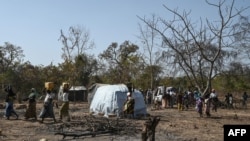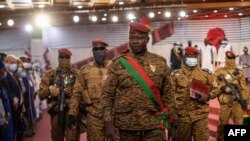Aid groups say the number of people displaced by conflict in Burkina Faso in January spiked to 160,000, bringing the total displaced in the country to 1.7 million. The aid groups worry the crisis stemming from Russia's invasion of Ukraine will draw much-needed humanitarian funding away from Africa's Sahel region.
The spike in displacements comes amid a six-year conflict with armed groups linked to Islamic State and al-Qaida and a military coup on the 23rd of January, which saw a military junta come to power in the West African country.
Since January 2019, nonprofits say, the displaced population in Burkina Faso has grown by 2,000%, with over 1.7 million people now uprooted.
Tom Peyre-Costa is spokesperson for the Norwegian Refugee Council (NRC) in West & Central Africa.
“There are increasing numbers of attacks, the destruction of crops, the theft of livestock, which are preventing families from accessing their fields and their food stocks. Faced with an inability to feed their families, people have had to flee and move toward towns,” he said.
Peyre-Costa added that some donors have said they might reduce aid funding for Burkina Faso as money is diverted to the crisis in Ukraine.
“Some donors have already indicated that they would proceed to a 70% cut of our funding to support operations in Ukraine and we are very concerned this will become a trend,” he said.
Burkina Faso’s military junta, led by President Paul Henri Damiba, has said it hopes to restore security to the country and allow people displaced by the conflict to return home.
Asked if security has improved for Burkina Faso since the start of 2022, Paul Melly, an analyst with London based think tank, Chatham House, sounded cautiously optimistic.
“The security situation in Burkina Faso has begun to improve in some respects. We’ve seen some significant successes for the armed forces… But it’s still too early to say whether the military’s commitment to improved, sustained success in tackling jihadist violence, whether we’re seeing results in that respect,” he said.
He points out that many of the recent successes for the military resulted from closer cooperation with French forces, which was instigated by ousted president Roch Kabore.
Alexandra Lamarche, a senior advocate for West and Central Africa at Refugees International, a Washington-based nonprofit, says the crisis in Ukraine will have devastating effects on crises across sub-Saharan Africa, not just in Burkina Faso.
“Russia is one of the leading grain exporters in the world. As the international community cuts economic ties with Russia, we can expect a global shortage… In Sub-Saharan Africa this will leave additional people in need of emergency food assistance, many of which would not have otherwise required aid,” she said.
She added that if donor attention is singularly focused on Ukraine in the coming weeks, it may be too late to mitigate the consequences of widespread food insecurity.

